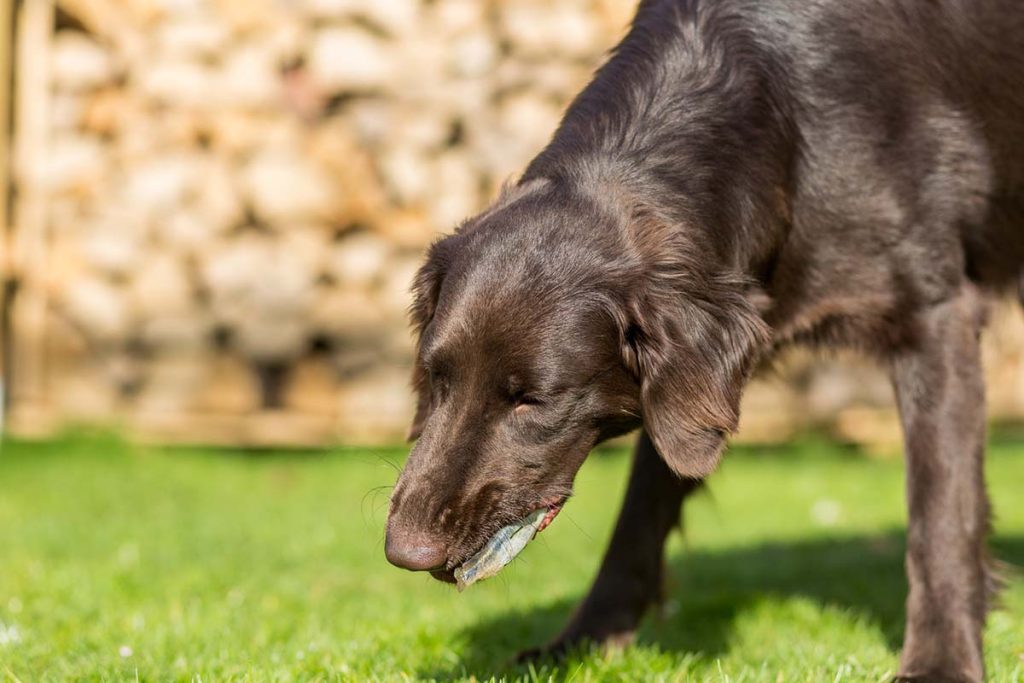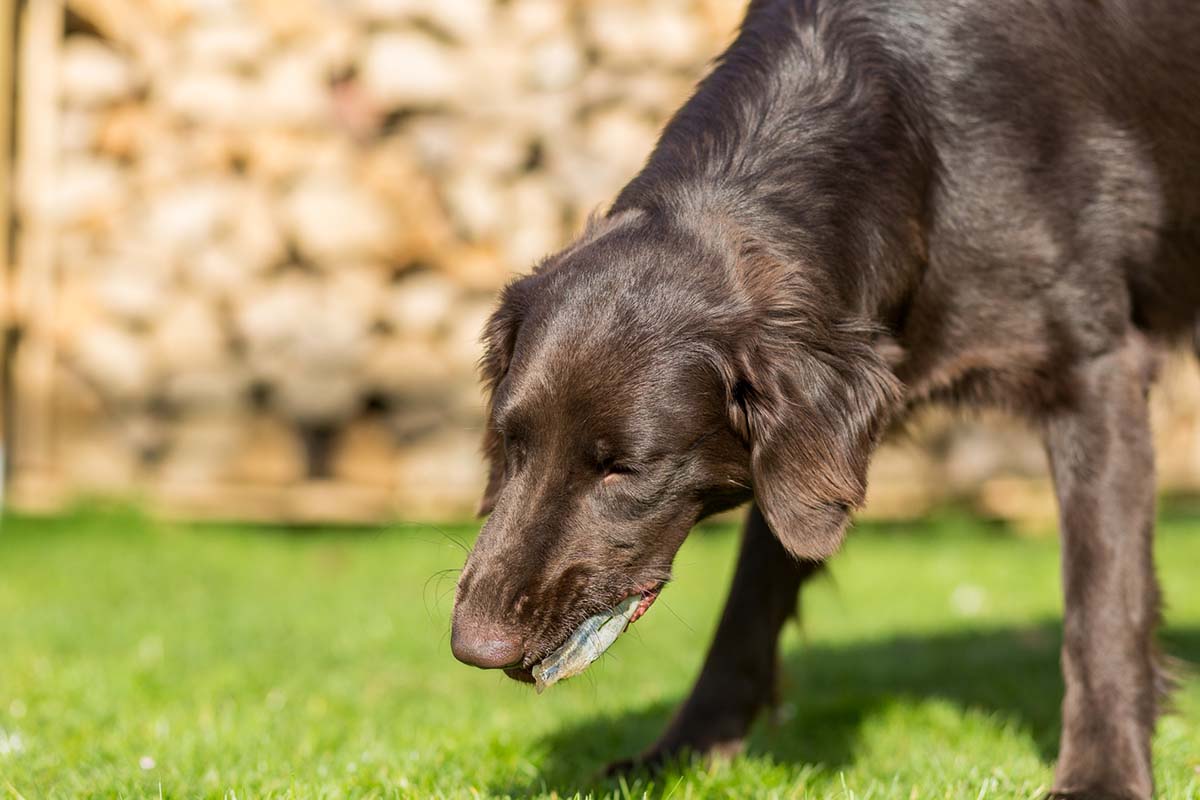Very few things frighten a loving pet parent more than to see their dog vomiting up white foam. They often fear something is very wrong. The truth is there are many reasons why your dog might be throwing up white foam.
Let’s take a look at some of the common causes and when you should be worried.
Why Is My Dog Throwing Up White Foam?

There are a number of possible reasons why your dog is vomiting white foam. These include something as innocuous as an upset stomach because he ate something that disagreed with him, to something very serious like an intestinal blockage.
Some of the most common reasons for white foamy vomit include:
- indigestion
- acid reflux
- abrupt dietary changes
- food allergies or intolerance
- pancreatitis
- bacterial infections or viral infections
- foriegn object obstruction
- bloat
- kennel cough
- toxicity
Read on for a breakdown of each.
Indigestion
Indigestion is probably one of the most common reasons why your pet might be vomiting white foam. Usually, this is because he ate something that didn’t sit well with him, such as grass or something he found in the trash.
It can also, however, result from eating too quickly or as a result of eating right after he finished vigorously exercising. Either one can upset your dog’s stomach and cause him to have indigestion. If this is the case, the vomiting should stop after a short period of time, and you shouldn’t see any other symptoms.
Acid Reflux
Another reason for a dog vomiting white foam is something called acid reflux or bilious vomiting syndrome. This happens when a dog’s stomach becomes irritated by excess bile or stomach acids.
If this is the cause, you will likely see your dog vomiting the white foam in the morning before breakfast. This kind of problem can usually be resolved by feeding your dog smaller, more frequent meals with a snack before bedtime and first thing in the morning.
It is also possible, however, that your dog will benefit from antacid medication as well. This can help keep the stomach acids under control and stop the vomiting.
Abrupt Dietary Changes
This is another common cause of vomiting in dogs. Abrupt changes in dog food can cause inflammation in your dog’s digestive tract. That inflammation causes an increase in the muscular movements of the intestines, something called peristalsis, and the stomach acid is not properly absorbed as a result.
When that happens, it can stimulate vomiting. You might not realize it, but your dog’s stomach is very sensitive to changes. That’s why you should implement any dietary changes gradually over the course of 1 – 2 weeks. Add in the new food to his old food until the old food has been completely replaced. That will make him and his stomach much happier.

Food Allergies or Intolerance
Just like with humans, your dog can have food allergies or be intolerant of certain ingredients. This can cause vomiting too, but it is also often accompanied by a skin rash on his legs and chest or abdomen.
If you suspect this is the cause, it might be necessary to switch him to a bland diet that his system can tolerate better. Your veterinarian can check for allergies to identify the specific ingredient involved, but this can be costly and time-consuming. It might be easier to feed bland food composed of chicken or lamb and white rice.
Pancreatitis
Another common reason for a dog to vomit white foam is a condition called pancreatitis. The pancreas is an organ that is located near the stomach.
It serves two purposes: the production of insulin to transport glucose from the blood into the cells and the production of digestive enzymes to aid in the digestion of food in the small intestine. The latter means it’s a vital part of your dog’s digestive system.
If your dog gets ahold of some human food — a common occurrence, particularly around the holidays — it can cause the pancreas to become inflamed as it tries to produce enough enzymes to digest that food. This is most likely if the human food in question is particularly high in fat, a common ingredient in human food.
When the pancreas becomes inflamed, it can cause vomiting and diarrhea, which can be severe enough to be life-threatening. It’s something that usually requires some attention from your dog’s veterinarian, and it may involve a dietary change.
If the underlying cause of your dog’s vomiting is pancreatitis, you’re likely to see other symptoms like diarrhea, and the symptoms will be more persistent than something like acid reflux or indigestion.
Bacterial Infections or Viral Infections

Another common cause of dog vomiting is a bacterial or viral infection. Probably one of the most well-known is parvovirus. Parvovirus is a severe infection that can cause vomiting and bloody diarrhea.
There are, however, also other bacterial infections or viruses that can cause gastrointestinal inflammation leading to vomiting, with or without other symptoms. In most of these cases, it’s important to take your dog to the vet as soon as possible to avoid further complications.
Infections in the gastrointestinal tract, including things like parasites, can be highly contagious and life-threatening. Of course, one of the most frightening of these is rabies. Rabies is a virus that can cause your dog to vomit white foam, and it’s usually fatal once the symptoms have begun.
The possibility of a serious infection like that is why it’s important to get your best buddy checked out as soon as possible, and it’s also why it’s important to ensure your pet is properly vaccinated. There are vaccinations to prevent both rabies and parvovirus, but of course, there are no vaccinations for every possible infection.
Foreign Object Obstruction
This is another serious underlying condition that can cause vomiting. Dogs often swallow foreign objects like toys or bones, and sometimes, these can become lodged in the digestive tract to cause an obstruction.
This is an extremely serious situation that can quickly become life-threatening. Usually, your dog will be showing other symptoms like abdominal pain or stressful breathing. If the vomiting persists and/or your dog is showing these other symptoms, it’s important to get him to the vet ASAP.
Your vet will likely need to take X-rays to confirm the presence of a foreign body in the intestinal tract, and if that is the case, your dog may need surgery to remove it.
Bloat
Another possible cause of vomiting white foam is something called bloat. It’s formally known as gastric dilatation and volvulus. It occurs more frequently in large breeds of dogs, whereby their stomach actually turns over on itself and twists off the esophagus and the small intestine so that nothing can enter or leave the stomach.
It effectively stops the activity in your dog’s digestive system. When this happens, it’s common for the first symptom to be vomiting white foam. If left untreated, the stomach will become distended with gas, fluid, or food, something that will be extremely painful for your dog.
Bloat is a medical emergency that requires immediate medical care. If you think your dog is bloated, you’ll need to rush him to your veterinarian or an emergency clinic. The vet will first try to relieve the gas buildup and untwist the stomach, but if this fails, your dog will require surgery to correct the problem.
Typically, vets will not only correct the twisting of the stomach, but they will also affix the stomach to the body so that it is more difficult for it to recur in the future. Following successful treatment for bloat, your vet will usually recommend feeding small, frequent meals going forward.
Kennel Cough
Kennel cough is a respiratory infection that can cause your dog to appear to throw up white foam. Though it appears as vomit, it might actually be that your dog is coughing up a foamy white liquid. This is usually mucus and fluids from his respiratory system.
It’s also possible that your dog might be throwing up mucus and fluids from the respiratory system that he swallowed. If he is actually coughing up white foam, you won’t see his stomach lurching as you do when he vomits.
Kennel cough is another one of those health conditions that is preventable with vaccination against Bordatella, the causative agent. You should make sure your dog is vaccinated against this if he commonly mixes with other dogs.
Kennel cough is highly contagious and, as the name suggests, is frequently picked up in the kennel. Therefore, if you regularly board your dog or even just regularly take him to the dog park, it’s suggested that you have him vaccinated for kennel cough every six months.
Toxicity
Yet another reason your dog might be vomiting white foam is that he might have ingested something that is toxic. Puppies are particularly susceptible because they will often swallow things in their environment.
Certain plants, some medications, and certain foods, like grapes, onions, or garlic, can all be toxic for dogs. If you suspect your dog has swallowed something toxic, you’ll want to contact the Pet Poison Control Center run by the ASPCA.
They can advise you on the steps to take while you get your dog to the veterinarian. Treatments vary, so it’s important to seek a vet’s care immediately.
Other Health Issues
Finally, a variety of underlying health issues can cause your dog to vomit white foam. For example, kidney disease can cause toxins to build up in your pet’s blood, which can then cause him to vomit.
This is why it’s important to get regular checkups and wellness advice from your veterinarian. They can catch problems early while they are still able to be treated fairly easily.
What’s the Difference Between Vomiting and Regurgitation in Dogs?

It’s important to note that there is a difference between actual vomiting and simple regurgitation. Vomiting involves the forceful expulsion of material from the stomach and upper intestine. You will see the abdomen actively contracting if your dog is vomiting.
On the other hand, regurgitation is a passive process. Dogs often regurgitate their food soon after eating. Most often, your dog will eat what he has regurgitated since it is usually undigested and doesn’t contain bile. Vomit is usually partially digested and contains bile.
While vomiting can be related to serious health issues, regurgitation is not. It’s not something to worry about.
When Should You Be Concerned About Your Dog’s Vomiting?
You should be concerned about your dog’s vomiting if it happens more than once in a short period of time or if it is accompanied by other symptoms. Here are some reasons to take your dog to the vet if he is vomiting:
- He is vomiting frequently
- He has been vomiting over a long period of time (chronic vomiting)
- He is vomiting up blood
- His vomiting is accompanied by fever, weight loss, diarrhea, loss of appetite, or lethargy
- He is trying to vomit but is unable to bring anything up
- He vomits a lot during a single episode
- You suspect or know he has ingested a foreign body
- Your vomiting dog is also experiencing seizures
This content is for informational use only and does not replace professional nutrition and/or medical advice, diagnosis, or treatment. It is not a substitute for and should not be relied upon for specific nutrition and/or medical recommendations. Please talk with your veterinarian about any questions or concerns.
